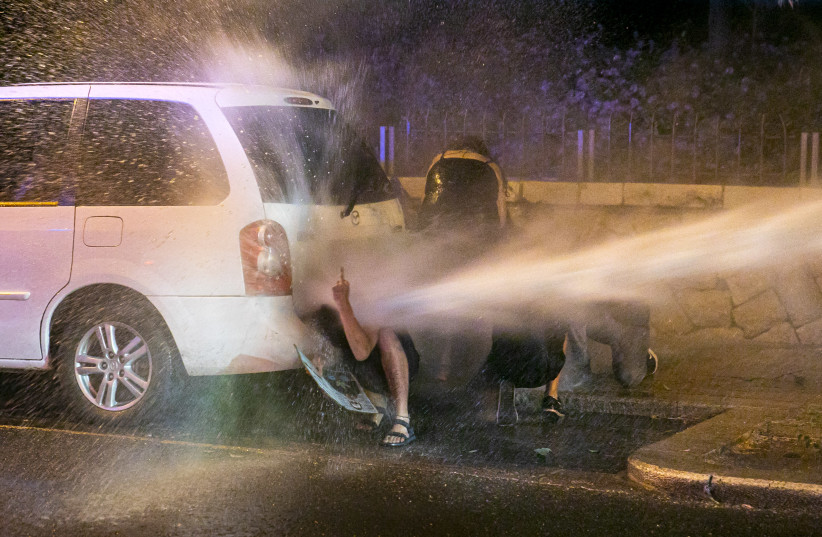The Israel Association of Public Health Physicians and Ear, Nose and Throat Physicians Society of the Israel Medical Association have called on Police Commissioner Kobi Shabtai and the Israel Police to strictly limit the use of water cannons to control demonstrators.
The water cannon used as a “stun gun,” they explained, has the air pressure of between five and 10 bar or more (the air pressure exerted by a water column 10 meters high). At such pressures, possible injury to people includes direct injury to the body and secondary injury from the person slamming against a wall or falling to the ground.
Water cannons can cause hypothermia, direct trauma from the pressurized water, secondary injury from a victim being knocked down or colliding with objects, or injuries from chemicals and dyes dissolved in the water. These medical problems – along with practical and civil rights concerns about intimidation, indiscriminate and disproportionate use, and collective punishment – highlight water cannons’ potential for misuse, they continued.
Therefore, the Israel Association of Public Health Physicians (IAPHP) calls on the police to announce a halt on the use of the water cannon until the investigation is completed and lessons are applied to prevent the recurrence of serious injuries as a result of the use of the overpowering “water Taser” as a stun gun.
The risks and impacts of water cannon use
Water cannons were first used for crowd control in the 1930s in Germany, and by the 1960s were frequently used during the civil rights protests in the US. Today they are now used worldwide by authorities to drive back protesters with large truck-mounted tankers whose pumps drive high-pressure hoses with little to no regulation. They may propel streams of high-pressure water aimed at pushing back crowds or low-pressure streams intended to douse.

Women who may be pregnant, the elderly and children should not be hit with the high-pressure spray. “These injuries are often severe and endanger the victim with irreversible damage and permanent disability. It is important to note that these risks are known and are documented in Israel and around the world,” the physicians group said.
Upholding the right to peaceful assembly
Last week, former Israel Air Force pilot Col. (res.) Udi Ori was interviewed on Channel 12 and Channel 13 TV from his bed at Tel Aviv Sourasky Medical Center. The colonel in the reserves had to undergo surgery to repair his right eye that was damaged by a water cannon while he stood on the sidelines at a Tel Aviv protest. He said he will probably have to undergo more operations and that his recovery will take a long time.
From the investigation of the injured treated by the medical teams and from the videos of the injury, “it appears that the injuries occurred as a result of actions that violated police rules.”
The medical groups said they would like to participate in an urgent discussion in the Police Measures Committee to present their professional position. Copies of the letter were sent to Attorney-General Gali Baharav-Miara, Health Ministry director-general Moshe Bar Siman Tov and the chief medical officer of the Israel Police.
Concerns raised by medical societies and human rights advocates
The chairmen of all the IMA’s 67 medical societies, as well as Physicians for Human Rights (PHR) and International Network of Civil Liberties Organizations (INCLO) also issued an official statement expressing “great concern over the intensification of the process of erosion of the characteristics of democracy and public order in Israel.”
